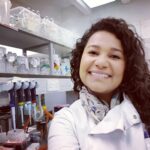
Explore a creative response to scientific research in this Translating Science commission.
Translating Science is a collaborative project which brings seven scientists from the Norwich Research Park together with established writers so that experts within two very different fields of work can gain fresh insight and inspiration from each other.
The scientist welcomed the writer into their world and explained their research, and the writer then went away and responded creatively to what they were shown. The result is a series of stories, poems and essays which will hopefully inspire, excite and trigger a deeper understanding of the benefits of science-based research for solving the many challenges we face, and help to influence policy and decision makers to make the right choices. Read through the rest of our commissions →
Soil Health: Traces of a Beginning
‘Soil Health: Traces of a Beginning’ is a series of poems by Edinburgh-based poet Vahni Capildeo which respond to Nasmille Larke-Majia’s research at the Earlham Institute into the microbial ecology of soils associated to different crops (sugarcane and coffee) and the Colombian Páramo environment. Vahni said:
‘Healthy soil is ‘alive’, with a diverse microbiome, an array of interdependent life forms and systems that lead to mutual flourishing and efficiency. Sadly, when soil is ‘cleaned’ for monoculture, the intensive farming of one crop, this damages and even kills the microbiome. The result of such cleaning is that more and more alterations have to be done to the soil for it to be capable of growing enough for harvests. Yet, eventually, the soil will be too dead to yield anything much.
‘However, life forms behave in unconventional ways. Some bacteria have evolved to eat the traces of explosives in soil. And soil health can be helped along by simple means, like introducing little goats to the environment. This gives us hope of finding ways to restore the microbiome and restore soil health.
‘Nasmille Larke-Mejía’s work ranges from fieldwork in ‘extreme environments’ to computer-based advanced interpretation of data. I was inspired by the mix of homeliness and complexity in Nasmille’s work and life. This moved me to write a sequence of poems in both experimental and simple forms. These poems range from the fictionalized story of someone growing up to be a woman scientist, to mock-instructions for soil cleaning or soil killing, a happy nursery rhyme of simple remedies, and a lament for the soil.
‘I hope this variety of approaches will interest different people in the question of soil health, that we depend on although we overlook it.’
Extreme Environments
do you mean shouting
i mean pressure
do you mean competition
i mean petroleum
do you mean war
i mean acidity and alkalinity
do you mean die
i mean go dormant
do you mean sleep
i mean live
do you mean survive
i mean flourish and thrive
do you mean exceptional
i mean expected
you mean expected things
doing the unexpected
think of yourself like a microbe
think yourself into the microbiome
Monoculture of a Verse
Instructions
Acquire a text. You may discover, seize, or ‘find’ it.
Found text
There is a garden in her face
Where roses and white lilies grow
A heav’nly paradise is that place
Wherein all pleasant fruits do flow.
Clean the soil before monoculture.
There is
Where
is that place
Where
– But you’ve killed everything that’s there! Too many chemicals.
– Not enough chemicals.
PIN IT geolocate ENCLOSE survey NAME
tea floribunda damask allergens no thorns tall stems
eliminate allergens good sounds good PIN IT geolocate
there is a market there is a market for if you don’t bruise
– It should be exactly the same, now I’ve put the seeds in.
– Seeds that perhaps aren’t growing?
Tell me again about a deliberately green and distinctive area
Where the human eye has fallen in love with funerals
And tell me how to find it because I own it, sweet, sweet,
And have never been there though I can taste it, unforgivable.
Add something that might kill everything: fertilizer, overwhelming the soil. You will see only what can resist high amounts of toxins. Overwhelming numbers of those.
– Overwhelm the soil.
The soil is overwhelmed.
What will you do with it?
Nothing grows.
Neither the lily, nor the rose.
What will you do with it?
An earthly miracle was that skin
Where breath begins as all renews.
The soil is overwhelmed.
The Scientist’s Tale
In the vicinity of desert
might be air conditioning.
An emperor might ask his daughter
about her heart’s desire –
where did she see her future?
In extreme environments, Papa.
Older, in the absence of desert,
I’ll miss my hi-vis clothing,
bright yellow, small in a big, big hole,
fragranced with gasoline, not jasmine.
In the vicinity of mountain
can there be gendered expectation?
Might an emperor ask his daughter
about her self-reflection –
how does she face a future?
Five years at the computer, Papa,
in a room without colour,
facing colourful paper,
I’ll think of myself as a microbe
and of the soil’s living structure.
The soil is our skin!
I learn all the time.
Things do what you don’t expect them to.
Which are you, Reader?
Soil, microbe, emperor, child?
Life Forms Use Things That Are Non-Conventional
Five Things a Poet Took for Granted
- That Norwich is honeycombed with tunnels
- That rivers are diverted beneath Milan
- That everyone once was a child and every child once held a whole fruit in their hand
- That sapodilla fruit contains natural chewing gum and extra white worms
- That some people aren’t in history and some places just happen to look how they look
Five Things that Freaked Out a Poet
- That mining explodes the whole cortex of the earth
- That some people will live near explosions until forcibly moved
- That you would go back to look at nothing
- That something is present in abundance where you looked for nothing
- That explosive-eating bacteria are feeding on the explosives that blew up the mines
A list is a conventional form for a poem.
Conventional farming may lead to a point of no return.
Porosity
you learn in school
little scuttling things
breathe through spiracles
you learn the skin
is the largest organ
of the human body
you won’t polish
your toenails
in case your toes can’t breathe
but, child,
who says
the soil has porosity?
emotion seeps into me
as I see the field
in which one thing
then nothing
can grow
the saying goes
may the road rise up to meet you
which big man says
soil, rise up, breathe, and live?
I feel myself crumbling
as the earth should crumble
but does not
a myriad creatures
continue their glad ways
n my gut
yet the soil microbiome
the skin of the earth
and its innards
have no words
for their breathless
their hardly recuperable state
Crop Rotation: A Nursery Rhyme for Sustainability in its Infancy
Send little goats through the weeds.
Poo, little goats, have a poo!
Since abundance is not diversity
Giving the soil what it needs
Send little goats through the weeds.
For abundance is not diversity
Living soil brings forth lively seeds
Replenished by a lagoon.
For enrichment is not toxicity
Send little goats through the weeds.
Poo, little goats, have a poo!
And enrichment is not toxicity
 Vahni (Anthony Ezekiel) Capildeo FRSL is a Trinidadian Scottish writer of non-fiction and poetry. After completing a DPhil in Old Norse and translation theory, Capildeo worked at the Oxford English Dictionary, in culture for development (Commonwealth Foundation), and in academia. Their eight books and eight pamphlets include Measures of Expatriation (Carcanet, 2016) (Forward Poetry Prizes Best Collection award). Capildeo’s interests include silence, plurilingualism, site-specific themes (especially poetics of time in place), and performance traditions and practice. They are Writer in Residence and Professor at the University of York, a Visiting Scholar at Pembroke College, Cambridge, and an Honorary Student of Christ Church, Oxford. Image (c) Adrian Pope
Vahni (Anthony Ezekiel) Capildeo FRSL is a Trinidadian Scottish writer of non-fiction and poetry. After completing a DPhil in Old Norse and translation theory, Capildeo worked at the Oxford English Dictionary, in culture for development (Commonwealth Foundation), and in academia. Their eight books and eight pamphlets include Measures of Expatriation (Carcanet, 2016) (Forward Poetry Prizes Best Collection award). Capildeo’s interests include silence, plurilingualism, site-specific themes (especially poetics of time in place), and performance traditions and practice. They are Writer in Residence and Professor at the University of York, a Visiting Scholar at Pembroke College, Cambridge, and an Honorary Student of Christ Church, Oxford. Image (c) Adrian Pope
 Dr Nasmille Larke-Mejía is a Postdoctoral Scientist on the GROW Colombia project working in the Agricultural Diversity Programme. She focuses on studying the microbial ecology of soils associated to different crops (sugarcane and coffee). Nasmille is an Environmental Microbiologist, specialized in the use of cultivation-dependent and cultivation-independent methods to study the microbial ecology of microorganisms in the terrestrial environment.
Dr Nasmille Larke-Mejía is a Postdoctoral Scientist on the GROW Colombia project working in the Agricultural Diversity Programme. She focuses on studying the microbial ecology of soils associated to different crops (sugarcane and coffee). Nasmille is an Environmental Microbiologist, specialized in the use of cultivation-dependent and cultivation-independent methods to study the microbial ecology of microorganisms in the terrestrial environment.
Nasmille finished her PhD in 2018 at the School of Environmental Sciences, University of East Anglia, working on characterizing soil and phyllosphere microorganisms that use isoprene as their sole source of C using techniques including stable isotope probing, amplicon sequencing and metagenome analysis.
You may also like...
It Comes Through the Air
A Translating Science commission from poet Heidi Williamson, inspired by research from Vincent Were

3rd April 2023
Orange
A Translating Science commission from novelist and NCW tutor Megan Bradbury, inspired by research from Professor Pete Wilde

3rd April 2023
Hardy
A Translating Science commission from scriptwriter and performer Shey Hargreaves, inspired by research from Professor Anne Osbourn

3rd April 2023






